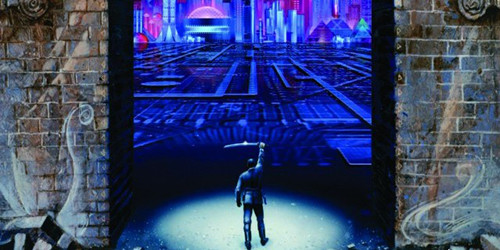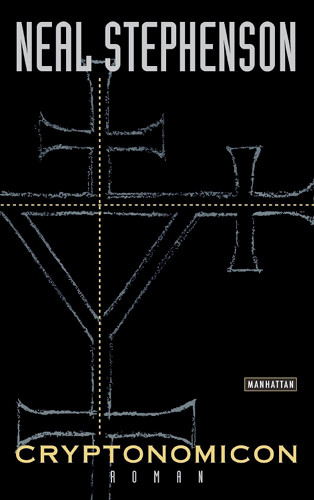Excerpt from the novel Snow Crash ![]()
![]() by Neal Stephenson
by Neal Stephenson ![]()
![]()
“Secret Agent Hiro! How are you doing?”
Hiro turns around. Juanita is right behind him, standing out in her black-and-white avatar, looking good anyway. “How are you?” she asks.
“Fine. How are you?”
“Great. I hope you don’t mind talking to me in this ugly fax-of-life avatar.”
“Juanita, I would rather look at a fax of you than most other women in the flesh.”
“Thanks, you sly bastard. It’s been a long time since we’ve talked!” she observes, as though there’s something remarkable about this.
Something’s going on.
“I hope you’re not going to mess around with Snow Crash,” she says. “Da5id won’t listen to me.”
“What am I, a model of self-restraint? I’m exactly the kind of guy who would mess around with it.”
“I know you better than that. You’re impulsive. But you’re very clever. You have those sword-fighting reflexes.”
“What does that have to do with drug abuse?”
“It means you can see bad things coming and deflect them. It’s an instinct, not a learned thing. As soon as you turned around and saw me, that look came over your face, like, what’s going on? What the hell is Juanita up to?”
“I didn’t think you talked to people in the Metaverse.”
“I do if I want to get through to someone in a hurry,” she says. “And I’ll always talk to you.”
“Why me?”
You know. Because of us. Remember? Because of our relationship—when I was writing this thing—you and I are tho only two people who can ever have an honest conversation in the Metaverse.”
“You’re just the same mystical crank you always were,” he says, smiling so as to make this a charming statement.
“You can’t imagine how mystical and cranky I am now, Hiro.”
“How mystical and cranky are you?”
She eyes him warily. Exactly the same way she did when he came into her office years ago.
It comes into his mind to wonder why she is always so alert in his presence. In college, he used to think that she was afraid of his intellect, but he’s known for years that this is the last of her worries. At Black Sun Systems, he figured that it was just typical female guardedness—Juanita was afraid he was trying to get her into the sack. But this, too, is pretty much out of the question.
At this late date in his romantic career, he is just canny enough to come up with a new theory: She’s being careful because she likes him. She likes him in spite of herself. He is exactly the kind of tempting but utterly wrong romantic choice that a smart girl like Juanita must learn to avoid.
That’s definitely it. There’s something to be said for getting older.
By way of answering his question, she says, “I have an associate I’d like you to meet. A gentleman and scholar named Lagos. He’s a fascinating guy to talk to.”
“Is he your boyfriend?”
She thinks this one over rather than lashing out instantaneously. “My behavior at The Black Sun to the contrary, I don’t fuck every male I work with. And even if I did, Lagos is out of the question.”
“Not your type?”
“Not by a long shot.”
“What is your type, anyway?”
“Old, rich, unimaginative blonds with steady careers.”
This one almost slips by him. Then he catches it. “Well, I could dye my hair. And I’ll get old eventually.”
She actually laughs. It’s a tension-releasing kind of outburst. “Believe me, Hiro, I’m the last person you want to be involved with at this point.”
“Is this part of your church thing?” he asks. Juanita has been using her excess money to start her own branch of the Catholic church—she considers herself a missonary to the intelligent atheists of the world.
“Don’t be condescending,” she says. “That’s exactly the attitude I’m fighting. Religion is not for the simpletons.”
“Sorry. This is unfair, you know—you can read every expression on my face, and I’m looking at you through a fucking blizzard.”
“It’s definitely related to religion,” she says. “But this is so complex, and your background in that area is so deficient, I don’t know where to begin.”
“Hey, I went to church every week in high school. I sang in the choir.”
“I know. That’s exactly the problem. Ninety-nine percent of everything that goes on in most Christian churches has nothing whatsoever to do with the actual religion. Intelligent people all notice this sooner or later, and they conclude that the entire one hundred percent is bullshit, which is why atheism is connected with being intelligent in people’s minds.”
“So none of that stuff I learned in church has anything to do with what you’re talking about?”
Juanita thinks for a while, eyeing him. Then she pulls a hypercard out of her pocket. “Here. Take this.”
As Hiro pulls it from her hand, the hypercard changes from a jittery two-dimensional figment into a realistic, cream-colored, finely textured piece of stationery. Printed across its face in glossy black ink is a pair of words
---------------------------------------------
| |
| |
| B A B E L |
| (I n f o c a l y p s e) |
| |
| |
---------------------------------------------


